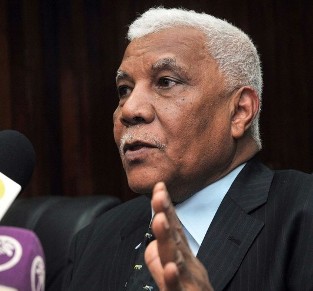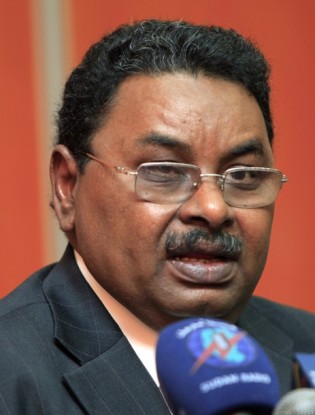Sudan’s NCP power struggle comes to surface, Bashir’s aides suspected of involvement in coup attempt
November 22, 2012 (KHARTOUM) – Sudanese authorities moved in the early hours of Thursday to foil what it claimed was a “subversive plot” planned by elements from the army, the paramilitary Popular Defense Forces (PDF), National Security and Intelligence Services (NISS) and within the ruling National Congress Party (NCP).

Following the announcement, rumours were swirling in the Sudanese capital that spoke of arrests of senior army officers who are also known to be longtime hard-line Islamists.
Rabie Abdel-Aati, an adviser to the Information Ministry and an NCP figure, added more fuel to the rumours when he went on the Dubai-based Al-Arabiya TV on Thursday and mentioned the name of Major General Kamal Abdel-Ma’Rouf who led military operations last April against South Sudan’s army in border oil region of Heglig.
Later Sudan army spokesperson Al-Sawarmi Khalid Sa’ad would deny that Abdel-Ma’Rouf was arrested and disclosed that he is currently in South Kordofan.
Sudan’s Information Minister and government spokesperson Ahmed Bilal Osman called for press conference and gave the first official version of the events that unraveled on Thursday.
Osman said that there were 13 people detained in connection with the alleged plot including ex-spy chief and presidential adviser Salah Gosh, Brigadier General Mohamed Ibrahim Abdel-Galil who is better known as ‘Wad Ibrahim’, and Major General Adil Al-Tayeb from the NISS. He did not disclose the names of the remaining participants.
The Doha-based Al-Jazeera TV reported that the former head of military intelligence Brigadier General Awad Mohamed Ahmed Ibn Ouf was also arrested.
Other uncorroborated reports named Brigadier General Fath Al-Raheem Abdulla who headed the joint Sudanese-Chadian border forces and former head of Sudan’s armoured corps Brigadier General Sideeg Fadl.
Well placed sources later told Sudan Tribune that former presidential adviser and head of NCP bloc in parliament Ghazi Salah Al-Deen Al-Attabani was summoned for questioning by NISS on his possible role in the plot but was later released.
The government spokesperson offered few details on the nature of the plot except to say that those named were planning to destabilize security while also spreading false rumours on health of 68-year old president Omer Hassan al-Bashir, who recently underwent throat surgery to remove a benign tumor. Officials insist he is in good health.
“The government has decided to abort this plot just before the zero hour as a preventive measure to avoid entering the country into chaos,” Osman said. “There were internal and external contacts [made] that were intercepted to move the ground to topple the regime through spreading rumors about the president’s health after his recent ailment”.
He stressed that the attempt was “limited” in nature and that it was not part of a wider movement in the army, PDF or NISS and denied any unrest in the military.
Osman said that some opposition parties have “wild dreams” that this move would bring about regime change.
“These are dreams without legs,” Osman told reporters.
Multiple security and military sources told Sudan Tribune that the NISS arrested around 100 pro-government Islamist elements who belong to a group widely known as “Al-Sae’ohoon” who formed the core of special forces fighting South Sudan rebels during the civil war since Bashir came to power in 1998 in a bloodless military coup backed by the National Islamist Front (NIF) .
Al-Sae’ohoon has been vocal recently over reform demands and expressed bitterness that the NCP leadership has softened stance on Islamic principles and gave too many concessions to South Sudan in the 2005 Comprehensive Peace Agreement (CPA), while allowing for army to suffer military setbacks.
A memo released on Thursday attributed to Al-Sae’ohoon in response to the arrests urged president Bashir to release those detained and described them as the safety valve of the 1989 coup since its inception all through the battles of Heglig this year.
The group underscored that those taken into custody were never carried away by earthly pleasures of power.
The memo blasted defense minister Abdel-Rahim Mohamed Hussein saying he bears responsibility for army failures in relation to South Sudan, Sudan People Liberation Movement North (SPLM-N) rebels and airstrikes carried out by Israel inside the country that recently targeted a weapons factory in Khartoum.
They went on to say that Hussein sent several generals into retirement only because they expressed their views and provided advice. “[Hussein] is stirring trouble with [former] head of Sudan’s armored corps Brigadier General Sideeg Fadl [who is] security valve of the [1989] revolution”.
“We are all waiting to see what will decisions will emerge [from you] and you must know for sure that they [detainees] all love you and endear you and have respect for you but your defense minister left them with no option but this one” said the memo.
Bashir has long resisted calls for sacking his defense minister over corruption charges and defeats on the battlefield. Hussein came under fire last April for the ease at which Sudan army lost Heglig oilfield to South Sudan.
Earlier this year multiple army sources told Sudan Tribune that a group of 700 army officers urged Bashir to carry out political and military reforms. They also made complaints about the morale and army preparedness. This was in response to the president’s call for them to prepare for the possibility of war with South Sudan.
BASHIR’S LOYALISTS
Among the significant arrests made today were for Brigadier General Wad Ibrahim who was one of the strongest candidates for the post of Interior Minister last year and served as military attaché to Sudan in Nairobi for four years.
 Prior to that Wad Ibrahim headed Bashir’s presidential security for seven years and served in southern Sudan during the civil war for twelve years. He participated in the retake of Heglig along with Major General Abdel-Ma’Rouf.
Prior to that Wad Ibrahim headed Bashir’s presidential security for seven years and served in southern Sudan during the civil war for twelve years. He participated in the retake of Heglig along with Major General Abdel-Ma’Rouf.
Wad Ibrahim enjoys tremendous popularity among Islamists and last year he gathered around 1,000 Islamists at his home including former presidential adviser Al-Attabani.
Last week sources told Sudan Tribune that Al-Attabani declined to run for Secretary-general of the Islamic Movement (IM) due to what he saw as interferences by influential government figures who pushed through amendments he opposes.
The IM convention outcome angered six Islamist factions, which vowed to continue to fight for reforms and removing corrupt figures.
Insiders say that Al-Attabani, who also heads the NCP parliamentary bloc, has recently stepped out of decision-making circles due to what they described as his unhappiness with the way the NCP has handled a number of sensitive issues lately.
He was fiercely critical of the government’s response to the resolution issued on 24 April by the African Union Peace and Security Council (AUPSC) over the situation between Sudan and South Sudan following their brief war in the same month around the border oilfields of Heglig.
Al-Attabani publicly criticized the government for accepting the resolution and its subsequent referral to the UN Security Council (UNSC), basing his objections on what he described – in an op-ed published by the daily Sudanese newspaper Al-Intibaha on 30 April – as the introduction into the AUPSC resolution of articles biased in favor of South Sudan and against Khartoum by the international community.
Gosh’s arrest marked the downfall of the once powerful spy chief who is better known for his deep cooperation with the United States on counter-terrorism following September 2001 attacks in Washington and New York by Al-Qaeda.
Last year Gosh was abruptly sacked by Bashir from his position as presidential adviser for security affairs. No reason was given for the decision.
This follows his surprise removal in 2009 by the Sudanese president from the directorship of the NISS. He was also stripped of his leadership position in the ruling NCP.
It is not clear what impact today’s arrests will have on the political scene but will likely add more pressure on Bashir who faces multiple armed rebellions, tensions with South Sudan, a struggling economy and disgruntlement within the NCP and the Islamist movement.
High prices for food have added to widespread public anger over losing the south and have emboldened opposition activists to call for protests this summer. Analysts say the crisis has also exacerbated divisions in the government and squeezed the patronage system they say Bashir has relied on.
Bashir along with his defense minister are also subject to arrests warrants issued by the International Criminal Court (ICC), which have restricted their movement internationally.
(ST)
